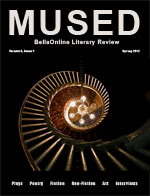In Her Own Words
Cynthia White
I have always loved the written word. My home growing up was filled with books, an ample selection in every room, and I was free to read anything I wanted at any time. As a shy and introverted child, I escaped into books; they amused, consoled, and educated me. I am still very attached to literature, by the way, and to my husbandís consternation, our most frequent visitor is the UPS woman with a package from my favorite bookstore.
At twelve, I was reading Roald Dahl; at fourteen, Agatha Christie; at sixteen, J. R. R. Tolkien. In university while pursuing a degree in English, I read Chaucer, Shakespeare, Faulkner, and Poe. For aspiring writers I recommend reading anything and everything. Great writing will teach you what works, and poor writing will teach you what doesnít.
Iím the eccentric who tries to get people to play word or writing games at parties or family gatherings and who enjoys reading the dictionary. Isnít everyone enchanted by words like quincunx and apoplexy and crepuscular? And I love the phone book. What an exciting place to find peopleís names, interesting, odd-sounding, or indifferent. I kid you not.
Throughout the years I found as many ways as I could to use the written word. I taught English as a second language, translated French to English, did technical writing, copy-editing, and when I was an executive with bankersí hours, in the evening when my kids were asleep I sold freelance non-fiction articles. Initially, I wasnít sure how to break into freelancing; so like the old adage, I wrote what I knew: business articles about my day job, book reviews, and when I had a surfeit of opinions I wrote passionate editorials.
I still write non-fiction, but now I write fiction as well. Each writer has his or her own way of going about the fiction writing process. When I sit down to write, I constantly move forward. I never stop to edit until Iím done. Never. Because if I do, then I get caught in the quicksand of editing and rewriting, and I drown. No matter how glaring the errors are in previous paragraphs, I save the luxury of editing for after the story is finished.
I also have a random approach to writing meaning that I donít always write linearly. I start with a piece of dialogue or a scene that Iíve been obsessing about, working it out as I go along. My outlines would fit on a post-it note, and the outline is written on the fly during pauses between paragraphs. For the novel manuscript Iím working on, I have two post-it notes. Okay, Iím lying; there are three.
For would-be writers, my favorite expression is, ďif you want to be a writer, then you have to actually write things.Ē There is no right or wrong way to get the words on the page; the trick is just doing it, no matter when or where. Donít wait for the writing fairies to whisper magic in your ear during the week of four Thursdays. Crank it out every day whether you feel like it or not. Sometimes the fairies come when you least expect them.
My own philosophy of writing--and of life--is that in the end we live the lives we choose. I choose to be a writer; no one is born with a pen in hand. Choosing to be a writer means practicing the craft because you will improve with time if you work at it. It means pushing the boundaries and writing pieces in different styles or genres that are outside of your comfort zone. A long time ago, one of my piano teachers made me learn a piece by Bartok. I detested that piece, a dreadful atonal nightmare; if it had a melody, I never heard it. Now I realize learning that awful piece with its peculiar rhythm made me a better pianist. The same is true in writing. Experimenting and steadfastly persisting will make you a better writer. I promise.
I am fascinated by the unusual story; so, I like to start with something odd ó but true - that Iíve heard. My mother, who is a poet in her own right, has always told me that fact is stranger than fiction. So, Iím the one who is nonchalantly eavesdropping on the conversation in a coffee bar or in the checkout line at the grocery. Some ideas fade quickly like a shooting star in my mindís eye; others stay with me forever like a plane circling an airport in a holding pattern, waiting for the best time to land.
The story that MUSED was kind enough to include in this issue is, in fact, based on a true story that I vaguely remember hearing as a child from my great-aunt Belle. The story is fiction because all of the facts died with my grandmother and my aunt many years ago. Itís a story that has haunted me for 40 years, and Iím honored that others find the story memorable. I am also sincerely grateful to Lisa Shea and MUSED for offering me this opportunity to share with others a glimpse into my writing world.

